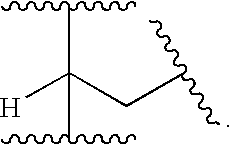CGRP antagonists
a technology of cgrp and antagonist, which is applied in the field of cgrp antagonists, can solve the problems of lack of molecular evidence for cgrpsub>, and none have shown the clinically important abortive effect of reversing
- Summary
- Abstract
- Description
- Claims
- Application Information
AI Technical Summary
Benefits of technology
Problems solved by technology
Method used
Image
Examples
example 1
[0130]
[0131] tert-Butyl (S)-5-((R)-3-(7-methyl-1H-indazol-5-yl)-2-(4-(2-oxo-1,2-dihydroquinolin-3-yl)piperidine-1-carboxamido)propanamido)-6-oxo-6-(4-(pyridin-4-yl)piperazin-1-yl)hexylcarbamate. To a solution of (R)-methyl 3-(7-methyl-1H-indazol-5-yl)-2-(4-(2-oxo-1,2-dihydroquinolin-3-yl)piperidine-1-carboxamido)propanoate (95 mg, 0.2 mmol) in DMF (2.0 mL) was added (S)-tert-butyl 5-amino-6-oxo-6-(4-(pyridin-4-yl)piperazin-1-yl)hexylcarbamate (78 mg, 0.2 mmol) followed by 2-(1 H-benzotriazole-1-yl)-1,1,3,3-tetramethyluronium tetrafluoroborate (71 mg, 0.22 mmol) and triethylamine (1 mL). After stirring at room temperature for 2 h, the solvent was removed and the crude product was purified by flash chromatography using 7% methanol in dichloromethane containing 2% ammonium hydroxide (ammonia content 28-30%) to give tert-butyl (S)-5-((R)-3-(7-methyl-1H-indazol-5-yl)-2-(4-(2-oxo-1,2-dihydroquinolin-3-yl)piperidine-1-carboxamido)propanamido)-6-oxo-6-(4-(pyridin-4-yl)piperazin-1-yl)hexylca...
example 2
[0132]
[0133] N-((R)-1-((S)-6-amino-1-oxo-1-(4-(pyridin-4-yl)piperazin-1-yl)hexan-2-ylamino)-3-(7-methyl-1H-indazol-5-yl)-1-oxopropan-2-yl)-4-(2-oxo-1,2-dihydroquinolin-3-yl)piperidine-1-carboxamide. To a suspension of tert-butyl (S)-5-((R)-3-(7-methyl-1H-indazol-5-yl)-2-(4-(2-oxo-1,2-dihydroquinolin-3-yl)piperidine-1-carboxamido)propanamido)-6-oxo-6-(4-(pyridin-4-yl)piperazin-1-yl)hexylcarbamate (230 mg, 0.27 mmol) in dichloromethane (10 mL) was added trifluoroacetic acid (10 mL) at 0° C. After 1 h at room temperature, the solvent was removed under high vaccum and then dissolved in methanol. The free base of title compound was liberated by passing the methanolic solution over Strata-X—C-33μ cation polymeric sorbent followed by elution with 3.0 M ammonia solution in methanol to give N-((R)-1-((S)-6-amino-1-oxo-1-(4-(pyridin-4-yl)piperazin-1-yl)hexan-2-ylamino)-3-(7-methyl-1H-indazol-5-yl)-1-oxopropan-2-yl)-4-(2-oxo-1,2-dihydroquinolin-3-yl)piperidine-1-carboxamide as a white solid in...
example 3
[0134]
[0135] tert-Butyl (S)-5-((R)-3-(7-methyl-1H-indazol-5-yl)-2-(4-(2-oxo-1,2-dihydroquinazolin-3(4H)-yl)piperidine-1-carboxamido)propanamido)-6-oxo-6-(4-(pyridin-4-yl)piperazin-1-yl)hexylcarbamate. The title compound was prepared from (S)-tert-butyl 5-amino-6-oxo-6-(4-(pyridin-4-yl)piperazin-1-yl)hexylcarbamate and (R)-3-(7-methyl-1H-indazol-5-yl)-2-(4-(2-oxo-1,2-dihydroquinazolin-3 (4H)-yl)piperidine-1-carboxamido)propanoic acid using the same procedure as described for tert-butyl (S)-5-((R)-3-(7-methyl-1H-indazol-5-yl)-2-(4-(2-oxo-1,2-dihydroquinolin-3-yl)piperidine-1-carboxamido)propanamido)-6-oxo-6-(4-(pyridin-4-yl)piperazin-1-yl)hexylcarbamate. The title compound was obtained in 66% yield. MS (ESI) 850 (M+H) ; Rf=2.07.
PUM
| Property | Measurement | Unit |
|---|---|---|
| pH | aaaaa | aaaaa |
| volume | aaaaa | aaaaa |
| volume | aaaaa | aaaaa |
Abstract
Description
Claims
Application Information
 Login to View More
Login to View More - R&D
- Intellectual Property
- Life Sciences
- Materials
- Tech Scout
- Unparalleled Data Quality
- Higher Quality Content
- 60% Fewer Hallucinations
Browse by: Latest US Patents, China's latest patents, Technical Efficacy Thesaurus, Application Domain, Technology Topic, Popular Technical Reports.
© 2025 PatSnap. All rights reserved.Legal|Privacy policy|Modern Slavery Act Transparency Statement|Sitemap|About US| Contact US: help@patsnap.com



